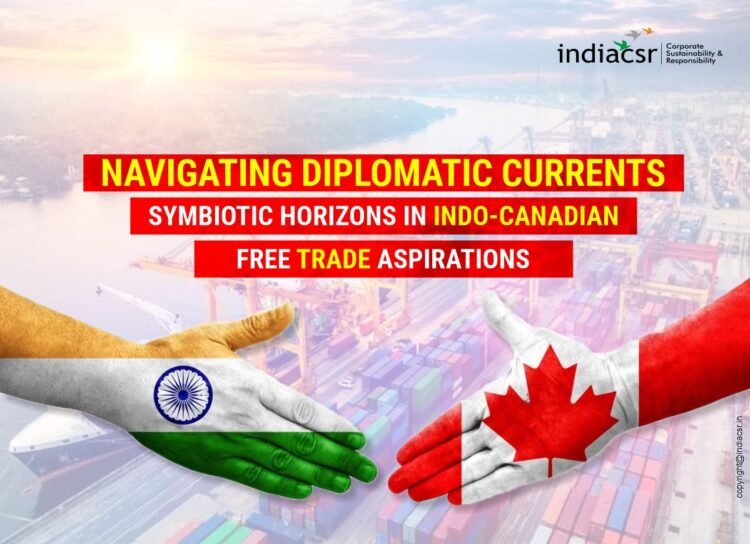In the wake of rising political discord between India and Canada, the quintessential focus remains on the mosaic of possibilities and mutual rewards that a Free Trade Agreement (FTA) can bring to the forefront
Amidst political discord between India and Canada, the emphasis is squarely on the mutual benefits that could arise from a Free Trade Agreement (FTA). The resolution of these conflicts is crucial to tapping shared economic and innovative potentials in diverse sectors. Stakeholders from both countries, with high hopes anchored in mutual economic gains, are closely watching the developments, highlighting the necessity for transparency and maintaining investor confidence. Respecting sovereignty and fostering cooperation is pivotal to creating a conducive environment for trade talks and addressing serious concerns raised by each country. A diversified, balanced, and reevaluated approach to trade interests and strategies is essential in the present global context, with long-term, resilient, and sustainable partnerships as the ultimate goal, promising symbiotic growth and development for both nations.
Reflecting on Mutual Interests
While the political discord has created a tense atmosphere, it’s crucial for both India and Canada to remember the shared interests and mutual benefits that can be derived from a potential Free Trade Agreement (FTA). Both countries have significant stakes in each other’s markets, and an agreement could bolster economic growth, create jobs, and foster innovation in both nations. For instance, India’s expertise in IT and software can complement Canada’s advanced research and development sectors, possibly leading to fruitful collaborations.
Urgency for Diplomatic Resolution
The repeated emphasis on the continuation of talks post the resolution of the political disagreements highlights the urgency for both nations to address and resolve their diplomatic differences. Strengthening diplomatic relations and trust between India and Canada is the cornerstone for progressing on trade talks and realizing mutual economic benefits. The prolongation of the current tensions will not only delay the prospective economic gains but can also result in missed opportunities.
Stakeholder Expectations
Stakeholders, including exporters and industrial sectors from both countries, are hopeful and are closely watching the developments. Their expectations are anchored in the belief that the mutual economic benefits will eventually prevail over the current disagreements. While the pause is seen as temporary, there is a pressing need for transparency and clear communication to manage the expectations of stakeholders involved and to maintain the business and investor confidence.
Balancing Sovereignty and Cooperation
In addressing the diplomatic concerns raised by India, both nations need to navigate the fine line between respecting sovereignty and fostering cooperation. The allegations of anti-India activities in Canada raise serious concerns, and addressing these issues in a constructive manner is pivotal for creating a conducive environment for trade discussions. While sovereignty is paramount, the pursuit of shared economic interests requires a cooperative approach and mutual respect for each other’s national interests and security concerns.
Diversification of Trade Interests
Beyond the mentioned areas of interest like textiles, leather, dairy, and agriculture, there is room for exploring collaboration in other sectors such as technology, energy, and education. Diversification of trade interests can enrich the economic relationship, and exploring new avenues can provide additional momentum to the trade talks. Both countries can benefit from a comprehensive and diverse trade partnership, adding layers to their economic relations.
Reassessing Trade Strategies
In light of the ongoing circumstances, both India and Canada may need to reassess their trade strategies and priorities. A pragmatic and balanced approach that aligns with the evolving geopolitical and economic landscape will be instrumental in navigating the complexities of international trade relations. Reevaluation of strategies will also allow both nations to identify and leverage their competitive advantages, ensuring that the trade partnership is equitable and mutually beneficial.
The Global Context
The ongoing situation between India and Canada is not isolated; it unfolds in a global context marked by shifts in trade dynamics and international relations. The resolution of the current discord will not only serve the interests of both nations but can also contribute to global trade stability. Other countries and international entities may be observing the developments, and a successful resolution can set a positive precedent for addressing conflicts in international trade relations.
Long-Term Vision
Lastly, while addressing the immediate concerns is crucial, both India and Canada should maintain a long-term vision for their bilateral relations. The focus should be on building a resilient and sustainable partnership that can withstand future challenges and disagreements. A long-term perspective will ensure that the relationship is built on solid foundations and can evolve and adapt to the changing global environment.
Copyright@ India CSR
Also Read
- Indo-Canada Relations: 7 Challenges in 2023
- Mahindra’s Affiliate Resson Aerospace Corporation Dissolves Amid Diplomatic Strife between India and Canada
- Anand Mahindra’s Remuneration: A Comparative Analysis 2023
- India-Canada Tensions: Anand Mahindra’s Bold Move Triggers Rs 7200 Cr Financial Upset
- 10 Reasons Why India Suspends Issue of Visas in Canada







